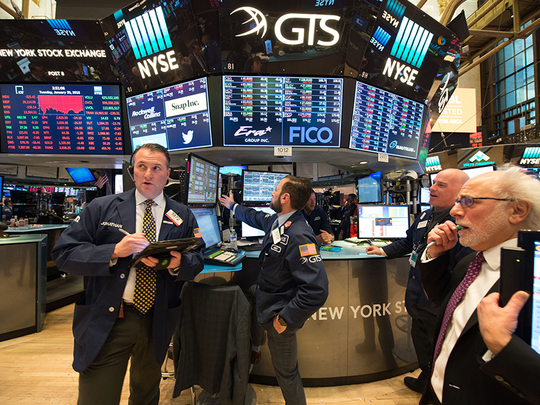
Dubai: Fund managers said the sell-off in global markets is unlikely to continue as traders shift their focus on fundamentals, however they expect more volatility as central banks phase out quantitative easing.
The trigger for the meltdown last week was the better-than-expected jobs report last week, which fuelled speculation of higher inflation and therefore higher rates in 2018, and therefore the US 10-year yield jumped to its highest level in 4 years to 2.85 per cent.
As a result, on Friday, the Dow Jones Industrial Average fell more than 2.5 per cent or 665 points, the largest fall since June 2016, after losing more than 1,000 through the week. The S&P 500 index fell 2.12 per cent to close at 2,762.13, its biggest daily fall since September 2016. The decline meant a loss of $1 trillion (Dh3.67 trillion) in market value.
“There were a variety of factors for the sell-off and most of the factors are not new. We have been talking about the path of the rate increase and inflation with wage growth for some time. Most investors have made money, and were waiting for some kind of a reason to take profit, so they found a reason,” Nadi Bargouti, Managing Director — Head of Asset Management at Emirates Investment Bank told Gulf News.
“We agree that rate hikes will be negative for equity markets, but I don’t think that justifies a 3.5 per cent drop in equities just due to the Fed,” Bargouti added.
Last December, the markets had been expecting three rate hikes in 2017, but analysts are widely expecting four hikes this year due to expectations of rising inflation.
Pause
“We expect markets to take a pause, and focus on fundamentals and corporate earnings. Data points to a synchronised growth, strong corporate earnings and normalisation of volatility regime that had been suppressed by central banks,” Vaqar Zuberi, Head of Hedge Funds at Mirabaud Asset Management (Switzerland) told Gulf News.
According to UBS, About 80 per cent of the companies have published their results and are on track for a 13-15 per cent earnings growth and 7 per cent revenue growth. The companies have given higher guidance in 2018 after taking a lower tax rate into consideration.
But the market volatility is seen as a precursor as central banks pull back from unprecedented levels of quantitative easing by central banks.
“We would see normalisation of volatility in the market which had been suppressed since the past 9 years. This week was extreme, but investors will to have to get used to higher more normal levels of market volatility,” Zuberi said.
For example, the US Federal Reserve’s balance sheet is up 5-fold to $4 trillion since 2008, meaning about $3.2 trillion was pumped in the market, which many analysts believe has inflated asset prices, and suppressed volatility.
Fund managers are also trying to re-position themselves looking at the yields in fixed income.
“A lot of people were re-adjusting their portfolio on income earning assets, trying to gauge if they were better off with a corporate giving them a dividend, which are seen as less competitive versus fixed income instruments,” Zuberi said.
They will also see if traders will buy on dip as they did in the past decade.
“We will see buyers early next week, but they will be cautious. Markets will be in territory of indecisiveness, and traders will cautiously wait and see where the market goes,” Bargouti said. Emirates Investment Bank would want to see a 5-10 per cent further decline for them to be a buyer.












